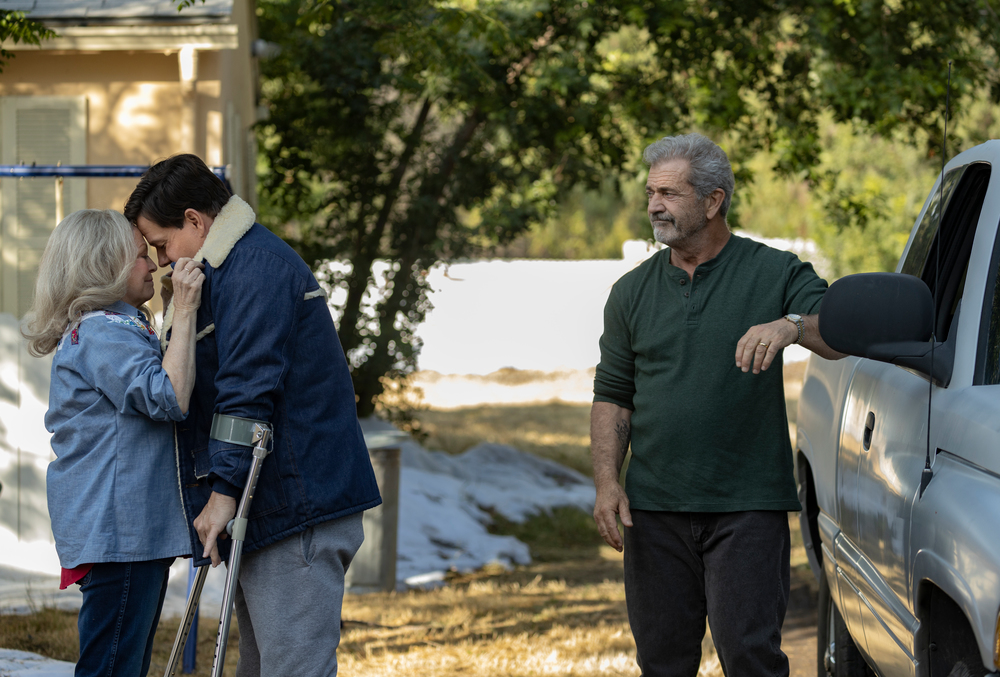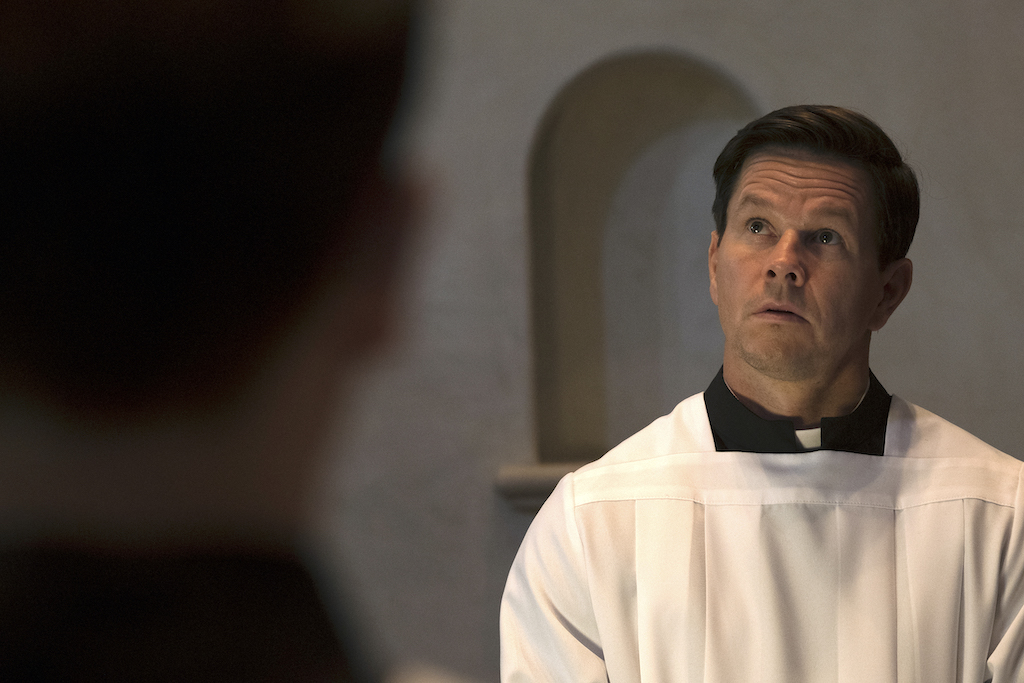It all began when two priests from his parish and Mark Wahlberg went to dinner and they pitched him the story of Stuart Long, an abrasive, bad-tempered failed boxer, turned failed actor, turned bouncer turned deli manager, who eventually found his calling in the priesthood.
Intrigued by this remarkable story of redemption, Mark signed on to play the titular role of Father Stu. Bill Long, Stuart’s father, is played by Mel Gibson, and as the film gods would have it, the screenplay penned and helmed by Rosalind Ross, Gibson’s partner, best known for her penchant for war stories and epic sagas.
“Mark was initially perplexed why two priests were pitching him a movie,” began Rosalind. “Mark related to the story on a very personal level.” (Let’s say he wasn’t an altar boy in his childhood. Mel Gibson has also had his fair share of run-ins.) Raised as a Catholic, the story tapped a deep vein inside Wahlberg. Despite his impressive accolades, it still took six years to finally get Father Stu made. Wahlberg previously enlisted David O. Russell (The Fighter, American Hustle) to get his project off the ground, but it never materialized.

Rosalind Ross
Rosalind and Mark first met on the set of Daddy’s Home 2 in 2017. Subsequently, she showed him a World War 2 naval drama screenplay she wrote that he attached to star in, but it stalled. She wrote another screenplay after that which also went nowhere. “Then he [Mark] called me up one day and pitched me Father Stu.” Ross admitted she was initially puzzled why Wahlberg would consider her to write the screenplay. Her initial instinct was to reject the offer.
After careful consideration, she became intrigued by it and there was a logical explantation. Ross concluded that she has a “natural attraction to men with bravado. I’m attracted to the vulnerability of men with rougher upbringings… a darkness inside them… a lack of something they’re trying to fill. That creates a depth of person.” Mark Wahlberg, and indeed Mel Gibson, certainly fit that bill.
Ross admires the brutally hard work both Mel and Mark have performed to “overcome the darker aspects of themselves to become better people.” This work was done over many years both in the background and in silence, away from public comment or approval.
Redemption is a very quiet, introspective process
A Profound Transformation
Father Stu took years to become a priest after the most notable life-changing event being an horrific motorcycle accident that ended his boxing career. Joining the clergy was a calling, his salvation and a chance to make peace with his past.
“This definitive event [accident] touched him in a profound way and opened his eyes to the presence of god.” Although the accident was a quantum step, his relationship with Carmen (Teresa Ruiz), a Sunday school teacher leaning toward atheism, planted the seeds of what Long’s life might become.
This is particularly illustrated when Carmen discusses the Catholic Catechism (an overview of the church’s beliefs) and Stuart Long questions it. His endless stream of probing theological questions engaged and attracted him into the church teachings. We also find out that his younger brother Stephen died suddenly years before and tore up the Long family. “I think Stuart had a lot of survivor’s guilt for both him and his father,” said Ross. Bill pursued self-destructive acts such as alcoholism and took out his anger on Stuart, while his mother Kathleen (Jacki Weaver) constantly criticized his life choices – especially joining the priesthood. Even the priesthood was aghast when Stuart wanted to join their ranks.
“Stuart’s struggle to justify why he was still alive when Stephen was was a heavy burden for him to carry. The anger inside him led him down the path of drinking and fighting.”

Kathleen Long (Jacki Weaver), Stuart (Mark Wahlberg) and Bill Long (Mel Gibson). Photo courtesy of Columbia Pictures
Rosalind Ross declared there were some similarities between Kathleen, Stuart and her own family. “Kathleen was inspired by my own mother and her dynamic with my brother who had his run-ins with the law.” Kathleen has limited capacity to offer Stuart support. “She’s not going to put him on the straight and narrow, but she’s never going to abandon him.” Kathleen is frustrated by her wayward son, but allows him to make his own life choices, despite her disagreement.
Kathleen and Bill’s relationship was irrevocably damaged after the family tragedy. Bill travelled the country looking for work while she was left at home. It was often a marriage in name only. This affected Stuart’s sense of stability. “Stuart was a product of his parents’ reactions to the path he took in life.”
After the ordination of Father Stu, his impact on his parents becomes undeniable. He even convinced them to get baptized; Stuart’s parting wish. “His efficacy as a priest was tested as he healed his father.”
Rosalind Ross doesn’t specifically believe that Stuart Long underwent a quantum transformation in the traditional sense. “It was more of an awakening that was there all along that brought him fulfilment. A transformation is such an external way of looking at it. I think there was something within him since childhood that was being nurtured until it was time to manifest.”
Father Stu was baptized at age thirty-five and ordained at age forty-three. “This brought him lightness and the feeling of coming home.” He worked tirelessly serving his community until his untimely death at age fifty.
A paucity of public information on Father Stuart initially challenged Ross. This impacted the early versions of the screenplay. “I don’t outline, but once I got his voice in my head and the spirit of the story, I just started writing.” There were many scenes she wrote that never made the final cut.
She decided early on that the key relationship between Stuart and Bill was the one she was going to focus on. That was her north star. “Every scene I wrote was an examination of that relationship even if Bill wasn’t present in the scene.”
Rosalind Ross thought long and hard before making this purposeful decision. The story could have focused on his mother and his battles with a disapproving clergy. “There is something beautiful in the return of the prodigal son.”
She did interview the real Bill Long and asked him what Stuart was like as a child. Bill paused before confessing, “I don’t know because I wasn’t really there.” That galvanized Ross’ story. “What becomes of a man who’s father’s not only around, but constantly disapproving? This is close to my heart and I wanted to explore it.“
